
KUSAL PERERA on 06/30/2016
In this neo liberal or free market global economy, Sri Lanka was counted as a country moving into the middle income group with an annual per capita income of 3,230 US dollars by the of the year 2014. It was expected to reach 4,400 US dollars by the end of this year (2016). In 2014 this was equivalent to Rs.436,050 and for a month, amounted to Rs.36,337 per person. In Sri Lanka, if every person had that income, there would not be beggars on the streets. There would not be “Samurdhi” recipients in villages. There are beggars at every street corner and Samurdhi recipients in every village. Though termed “per capita”, the majority is excluded from enjoying that income.
Neo-liberal economics distorts the living picture of poverty. The “poverty line”, GDP, inflation and foreign debt are mere “numbers” on paper. In real life they have no relevance to the majority. Life with the majority is quite a struggle. With a Rs. 2,500 increase from May 2016, the minimum wage in the private sector is Rs.13,500 only. The apparel sector alone has over 412,000 workers of which 85 per cent are female workers. They have to meet very high targets arbitrarily fixed by management, work compulsory overtime each day and sweat through a whole month to collect a “take home” pay of Rs.16,000 to 18,000 per month. This certainly is less than half the per capita income that Sri Lanka is said to enjoy.
This much sweated for income of less than Rs. 20,000 if compared to the basic needs of a family, is again less than half the Rs.40,887 required as the last “Household Income and Expenditure” survey of the Census and Statistics Department in 2012 September shows. The survey based on data collected on 1] demography 2] school education 3] health 4] food and non food items (like clothing, travel, electricity, kerosene, house rent) 5] family income 6] permanent assets 7] access to local facilities and household debt 8] details about the house and 9] cultivations and animal husbandry, says the average monthly income of an individual is only Rs.11,932, making the dollar per capita calculation a joke. In a family where there are two persons making a living and (as in almost all instances) the two don’t have equal income, the average monthly household income is Rs.25,778. Again, almost Rs. 15,000 less than the required minimum income for a basic family life.
In these calculations, “poverty” is all about a “consumer life” on a Rupees and Cents scale. That consumer life is one major struggle for the majority who don’t and cannot earn even the minimum required Rs. 40,000 per month. This is more than truth in rural life. Over 53 per cent of children under 05 years in rural society are malnourished, which leads to stunted growth. Rural culture doesn’t talk of nourishment, but of filling the belly. It is on this rural “culture” that most politicians argue, people don’t die of starvation in Sri Lanka. A whole family can live on a “Jak fruit” they say. This rural culture allows for poverty to go unchallenged in a heavily competitive free market.
The most important issue is, the monthly income used for calculations on poverty is not based on an income on a 08 hour working day. Calculations are done on the total income a person earns at the end of the month. The gross income accounted for therefore includes “overtime” done each day, work on holidays and some who do even part time work for extra income. Accepting such a monthly income reduces human life to one that exists purely for consumption with basic living and nothing more. All “Citizens” are turned into mere “Consumers” to live within a competitive market economy. The struggling “consumers” are thus denied time for a decent “cultural” life. In short, this crude acceptance of human life as just a “consumer” denies the citizen his or her “right to culture” and “cultural rights”.
“Urbanisation” and neo liberal “impotence”
Human beings are “cultural” beings with intellectual activities. The development of art, music, dance, architecture, cuisine, etc., are all part of civilisation with intellectual curiosity. Human life ispent in making a livelihood that only provides for a basic life, with no free time for intellectual indulgence and cultural engagements, is a life lived in poverty. Thus “poverty” has to be calculated with due recognition given to “right to culture” and “cultural rights” in addition to economic numbers and terms.
Unfortunately, over 37 years of moulding within a very competitive free market, has made almost all think and accept “freedom of choice” on the shop shelf as part of “democratic” living. A larger majority have accordingly attuned themselves to keep competing for comfortable lives at the expense of leisure and culture. The free market economy thus survives on the popular belief, social mobility can be achieved through “hard work” in a competitive market economy.
What is amiss is the fact that “employment” or income generation is not a timeless activity for mere living. The importance of the 08 hour working day lies in just that. The importance in the sacrifices the workers made with their lives at Haymarket Square in Chicago over 130 years ago is that, the whole world now accepts an 08 hour working day, written into law. That 08 hour working day has to be paid adequately in wages, for the worker to not only eat, feed and clothe himself and his family, but to sustain his and his families collective cultural life during the next 08 hours of the day, before s/he retires for the remaining 08 hours that makes a 24 hour day. That in fact is the logic of an 08 hour working day.
In a neo-liberal economy, “development” is all about middle class urban life. It is all about the “buying power” of an urban consumer. Poverty is what is compared with that urban life and “development” is always “city-centred”. When Narendra Modi was voted to power on a popular vote in 2014, one of his first major development programmes included the “100 Smart City” programme. The programme projected an urban population growth from 375 million to 590 million by year 2030. It also said, the urban share of the GDP would grow to about 70 per cent. He declared these “Smart Cities” will have very efficient and fast modern commuter facilities and all households would have free wi-fi. Now that is what city development is all about, apart from maintaining them.
The post war “development” in Sri Lanka during the Rajapaksa regime was no different. All proposed highways and circular road connectivity is Colombo centred and for urban use. Colombo city beautification had to be at the cost of the poor in the city. Coastal land acquired after the end of the war, was meant for a heavily hyped hospitality trade that left nothing for the war affected. Except for few menial jobs, investment in them meant accruing to profit in Colombo.
The much maligned “Colombo Port City” project begun by Rajapaksa is now being carried through under PM Wickremesinghe with the same Chinese company without any details given as to what was changed, if any was changed. And this hybrid government consisting of the Sirisena-Wickremesinghe duo also leans heavily on urban development, no different to Rajapaksa. Their only development project the “Megapolis” would leave all rural life outside the Megapolis, wholly neglected. Very much like Modi’s “Smart Cities”, the Megapolis is about enlarging the Colombo Port City model to cover the Colombo-Gampaha districts and some parts of Kalutara as well. The Megapolis transport plan, the only complete plan so far under Megapolis is expecting an influx of 1 million people into the new megacity, once completed. Their commuting will bring in an estimated 1.8 million vehicles daily into the city. In addition, the plan has tramcars, a light electric train service and 02 new railway extensions, one linking Kottawa and Horana and the other Kelaniya and Kosgama via Dompe.
There are no estimates on how much extra fuel these vehicles and the commuting systems would burn through day and night. For now, 66 per cent of foreign income generation is by the poorest segments in society; the plantation workers, apparel and export manufacturing workers and the migrant labour especially in the Middle East. All who would be left out of Megapolis development but whose sweat would be burnt off as fuel in the megacity. The irony is not that Prime Minister Wickremasinghe who is in complete control of economic planning believes, it’s megacities that develop whole countries in this new millennia and says at the launch of the Megapolis programme on 29 January (2016) at the Independence Square, “…..this megacity would be developed into a very strong economic centre and linked to the global economy. That would lift the whole country up”. The irony is, he wants others also to believe his fantasy is the right answer for development.
To date, after more than 150 days, there is no plan made available on the economic drive in the mega city. There is nothing tangible on what the total cost of the complete project is and what exactly is included in the project. Nothing is known about who funds the project in its different phases and its components.
Worst, there is no assurance that these projects would have Environmental Impact Assessments (EIA) done through independent and competent agencies, made available for public scrutiny. All one would know about it (that is to say, nothing) is in a 02.27 minute video titled “Colombo is South Asia’s Open City” (
https://vimeo.com/153351844) within the official website (
http://www.megapolis.gov.lk/ accessed on 28 June, 2016) that proudly says “An island metropolis with continental potential” and nothing more.
Eventually, with unknown or questionable contracts given out, there will be numerous construction sites coming up with colourful publicity campaigns. That’s where the big money comes and goes. In most countries like ours, politicians in power go for huge construction contracts. That was what we saw during Rajapaksa and we would see this under the Sirisena-Wickremesinghe government too, if they find investors to come in.
The launch of the Megapolis in January clearly proved this government under PM Wickremesinghe and his business class group brought in at a time of big responsibilities, knows nothing beyond business in a free market. They believe wooing foreign investors for a “Singapore” style city development is medicine for all aches and pains. Foreign Direct Investment and export oriented development over 03 decades has left the whole rural society unattended to. Rural youth were left to be used as cheap labour in Free Trade Zones, as frontline soldiers in a brutal war and as the cheapest housemaids in the Middle East.
As a development model, Singapore and Lee Kuan Yew are terribly over simplified and exaggerated icons of “success”. If, and I say it with much conviction, if Lee Kuan Yew was put in place here in Sri Lanka in late 60’s, he wouldn’t have known what to do with our tea and rubber plantations. With our subsistence farming in rural society where paddy is more a cultural life than economic farming. With our land tenure system and parcelling of land from generation to generation. Our historical bondages that keep rural society in a semi- feudal state and our ethnic divide that required political answers, were not on his plate. In Singapore, it was all minus that – a “city” asking for simple urban development. He would have been a total wreck here, far worse than even our failed leaders who knew the constituencies they had to deal with.
This neo liberal economic model that Wickremesinghe is obsessed with and trying to push through, is thus a heavily funded ultra urbanised “commercial development” that would only lead to a far more stressed out urban society. In a market, regulated not by “supply and demand”, but manipulated by big business for bigger and bigger profits.
The present day tragedy is, hyped neo liberal urban development does not allow for “total development”. We therefore don’t have modern libraries and reading rooms for school children and adults in beautified megacities. We don’t have modern museums, theatres, cinemas, art galleries and auditoriums for collective discourse in any of the development plans. What is invested upon in the megacity are huge shopping malls, modern cafes and restaurants with Indian, Chinese and Thai menus, recreational centres with massage parlours, Spas and night life with karaoke and casinos, toll-collected car parks, walking and jogging paths for the health conscious middle class urbanites and modern gyms. Added are modern private hospital and international schools. Total lack of facilities and space for intellectual cultural engagement, denies growth of a modern, culturally developed human.
Cultural impotence and divided society
The free market has developed its own novel addictive culture over a 38 year period. Those who were born into this free market in 1977 after Jayawardne was voted in with an overwhelming majority are now 38 years old. Those born 10 years after are 28 years old and the next generation born another 10 years later are now qualified voters at 18 years. This large and active population have never tasted any other economic life, but this unrestricted free market. Over the decades it has developed a very aggressive advertising industry that fashions consumer thinking. This advertising industry is so effective, the “Sinhala Buddhist” consumer who seldom thought of buying “chicken” 03 decades ago, was turned into a regular “chicken consumer”, with every grocer in every street corner selling “broiler chicken” much faster than even “Masoor dhal”. So was the “plain tea” that was largely replaced by “coke”.
This post ’77 urban and semi urban generation grew up taught to compete for personal gains. Social mobility for most came through new formal and informal sectors the free market economy created in and around Colombo. In all these new economic sectors, the new generation work for higher and higher “take home” pay. They don’t know of a decent pay for a 08 hour working day. The new and simple mind-set is, “money maketh a man”. They live in a society, where “collective” life has extremely little opportunity. Their workplaces are not where organised labour is and where collective bargaining is accepted. “Leisure” in this very individualised, busy urban society knows only restaurants, beach parties, Sunday buffets, karaoke and the like. That too is a “culture”. But lacks the intellectual refinement that comes with libraries, museums, theatre, discussion forums, music and art.
That market culture is now termed a “Gastritis culture” with most urban life from around 10 years on and the good majority of factory workers are ailing with continuous “gastric” disorders. It is also a market culture, that is ethno-religious in thinking. Trader competition for cash flow share in urban society has made a Sinhala Buddhist claim for supremacy for over 08 decades. In the second half of the post independent period, the Sinhala South came to be identified as everything national. Even the national economy was restricted to the Sinhala South, the North-East going under a brutal war. With a very competitive neo liberal economy in place, the Sinhala Buddhist supremacist claim thus became more or less “official”. In a weak and unrefined culture, racial affiliations take root quite fast. That becomes a fad when planted in social media patronised by this empty unrefined market culture of the new generation. The Sinhala niche in politics solely in the Colombo district that backs the “Hela Urumaya” types goes to prove this Sinhala trader mind-set in the competitive urban market.
Need for alternatives
Thus for two reasons, we need to go beyond talks in reforming governments and systems that could run a neo liberal economy better. One, that can never happen in our part of the world, where functional democratic structures and traditions have not come to stay, as in the developed West. In our part of the world where social structures and traditions are semi feudal and beliefs are parochial, rational thinking has little relevance in decision making. That is the reason why the concept of a “benevolent dictator” gets a stronger grip in the East and no more in the West.
In the South Asian context, neo liberalism and mega corruption go hand in glove. They cannot take divergent paths. Just 18 months of “Yahapaalanaya” proved it would not be clean and efficient as promised and as expected by urban middle class activists. PM Wickremesinghe, called “Mr. Clean” when in Opposition, has proved he is no more clean as expected. His most loyal royal gang in government is most accused of wheeler dealing. He wouldn’t even investigate them in a decent, trustworthy manner. Nepotism around President Sirisena is casually growing. Most accused for corruption under Rajapaksa are now in President Sirisena’s team with numerous designations.
The next important fact is neo liberalism in our context does not allow a Sinhala culture that can be progressive. That can be intelligent enough to understand the advantage of a pluralistic, inclusive society.
The neo liberal culture in the Sinhala South is an insecure culture. It therefore needs State patronage. This insecure majority psyche is being exploited by all neo liberal regimes in South Asia. From Modi to Sheikh Hasina to President Sirisena. From Modi’s anti Muslim Hindutva campaigns to Hasina’s Muslim extremism in Bangladesh to Sirisena’s “war heroes” and backtracking on the 2015 OISL Resolution, neo liberalism is all about supremacist racial politics that go hand in glove with mega corruption and nepotism.
A turn around to accountable, transparent and democratic governance is not possible without tinkering with the corrupt, politicised, inefficient systems. “Reforms” are too ancient to be even tried out. This today demands an alternative to this unrestricted, “urban centred development” submerged in mega corruption with total political patronage and State interventions. With “socialism” ruled out for an alternative, it is definitely a hard choice to make. But one that has to be made, and one that needs serious intelligent dialogue.
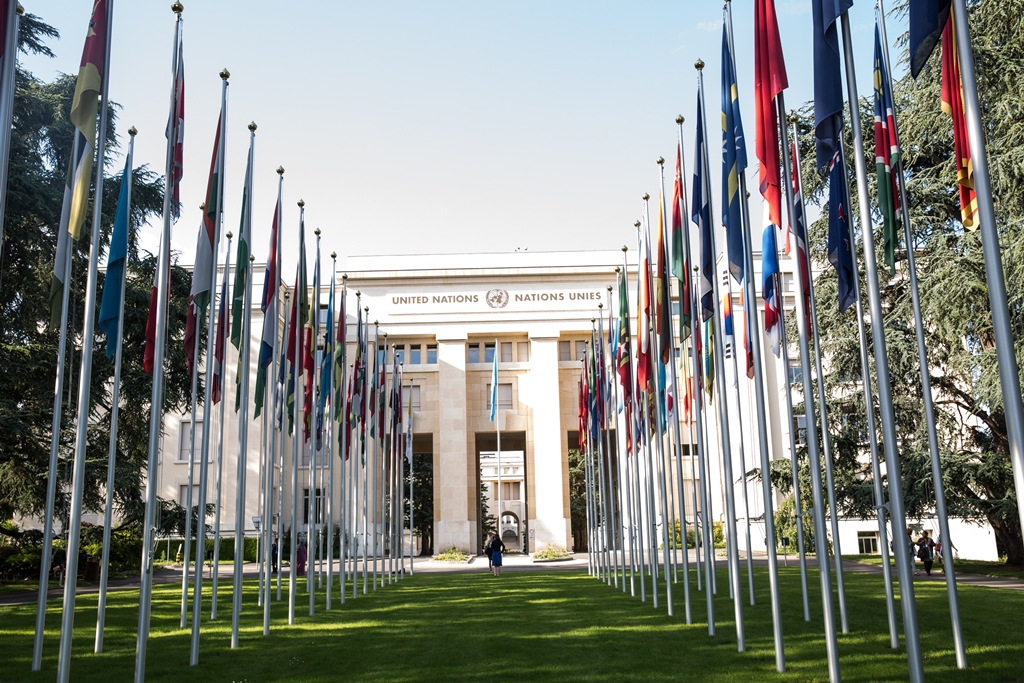


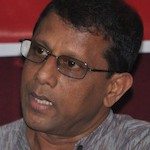

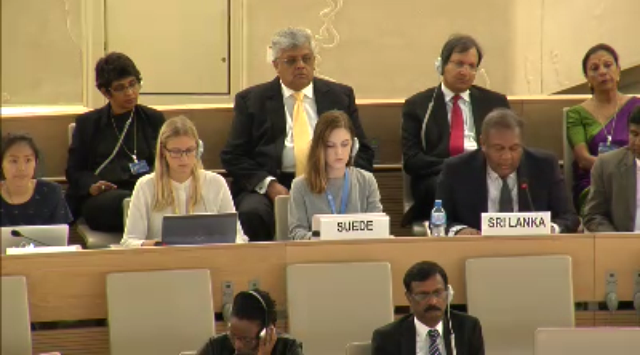
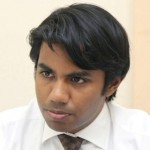




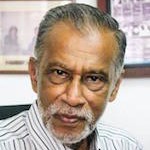
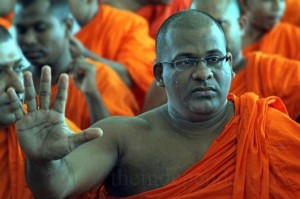
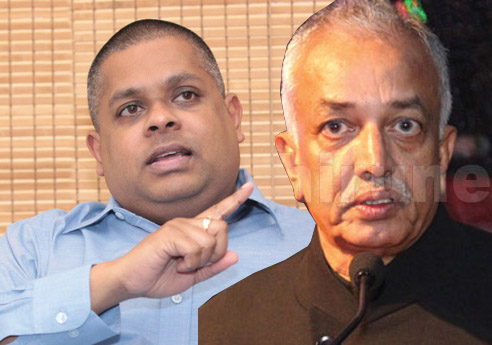

-ksn--FINAL.......jpg)
